Input interpretation

tellurium dioxide
Chemical names and formulas
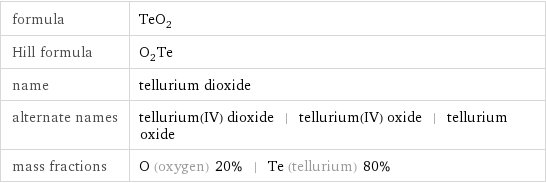
formula | TeO_2 Hill formula | O_2Te name | tellurium dioxide alternate names | tellurium(IV) dioxide | tellurium(IV) oxide | tellurium oxide mass fractions | O (oxygen) 20% | Te (tellurium) 80%
Lewis structure
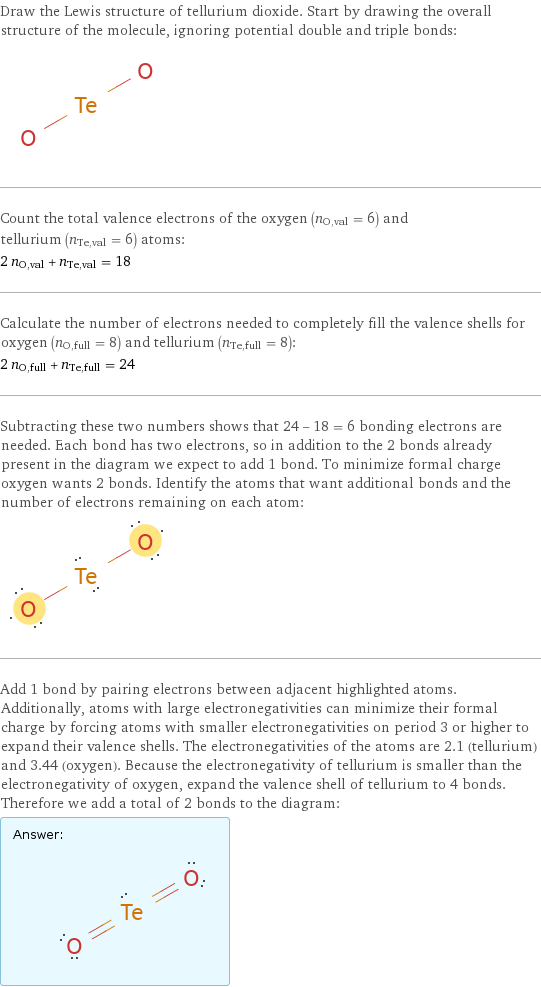
Draw the Lewis structure of tellurium dioxide. Start by drawing the overall structure of the molecule, ignoring potential double and triple bonds: Count the total valence electrons of the oxygen (n_O, val = 6) and tellurium (n_Te, val = 6) atoms: 2 n_O, val + n_Te, val = 18 Calculate the number of electrons needed to completely fill the valence shells for oxygen (n_O, full = 8) and tellurium (n_Te, full = 8): 2 n_O, full + n_Te, full = 24 Subtracting these two numbers shows that 24 - 18 = 6 bonding electrons are needed. Each bond has two electrons, so in addition to the 2 bonds already present in the diagram we expect to add 1 bond. To minimize formal charge oxygen wants 2 bonds. Identify the atoms that want additional bonds and the number of electrons remaining on each atom: Add 1 bond by pairing electrons between adjacent highlighted atoms. Additionally, atoms with large electronegativities can minimize their formal charge by forcing atoms with smaller electronegativities on period 3 or higher to expand their valence shells. The electronegativities of the atoms are 2.1 (tellurium) and 3.44 (oxygen). Because the electronegativity of tellurium is smaller than the electronegativity of oxygen, expand the valence shell of tellurium to 4 bonds. Therefore we add a total of 2 bonds to the diagram: Answer: | |
3D structure

3D structure
Basic properties
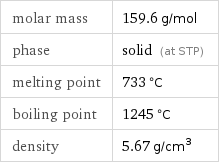
molar mass | 159.6 g/mol phase | solid (at STP) melting point | 733 °C boiling point | 1245 °C density | 5.67 g/cm^3
Units

Solid properties (at STP)

density | 5.67 g/cm^3
Units

Thermodynamic properties
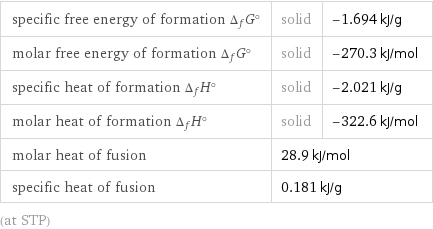
specific free energy of formation Δ_fG° | solid | -1.694 kJ/g molar free energy of formation Δ_fG° | solid | -270.3 kJ/mol specific heat of formation Δ_fH° | solid | -2.021 kJ/g molar heat of formation Δ_fH° | solid | -322.6 kJ/mol molar heat of fusion | 28.9 kJ/mol | specific heat of fusion | 0.181 kJ/g | (at STP)
Chemical identifiers
![CAS number | 7446-07-3 PubChem CID number | 62638 PubChem SID number | 24852276 SMILES identifier | O=[Te]=O InChI identifier | InChI=1/O2Te/c1-3-2 RTECS number | WY2675000 MDL number | MFCD00011263](../image_source/e076520fea427e04d7f2356e58984e90.png)
CAS number | 7446-07-3 PubChem CID number | 62638 PubChem SID number | 24852276 SMILES identifier | O=[Te]=O InChI identifier | InChI=1/O2Te/c1-3-2 RTECS number | WY2675000 MDL number | MFCD00011263
NFPA label

NFPA label
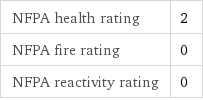
NFPA health rating | 2 NFPA fire rating | 0 NFPA reactivity rating | 0
Toxicity properties

RTECS classes | reproductive effector